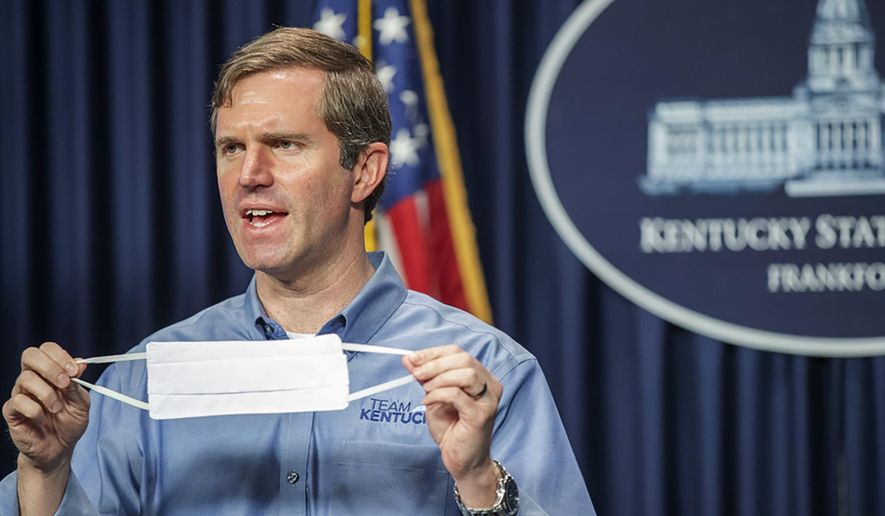FRANKFORT, Ky. (AP) - Gov. Andy Beshear presented plans Wednesday for phased reopenings of businesses, factories and churches next month as Kentucky reboots much of an economy shut down by the coronavirus.
Reopenings will start May 11 with a broad resumption of manufacturing and construction work, the governor announced. That initial phase also applies to car and boat dealerships, professional services and pet grooming and boarding, he said.
Businesses and plants will be expected to follow “healthy at work” guidelines to help contain the virus’s spread, Beshear said at his daily briefing. Those conditions include doing onsite health checks, wearing face masks, closing common areas and enforcing social distancing.
“They’re not the normal rules you would operate a business under because we’re trying to operate in the midst of a worldwide health pandemic,” the governor said.
The first phase also allows horse racing at Churchill Downs but with no fans, Beshear said.
The next phase of reopenings is set for May 20 and will apply to retail businesses and houses of worship, which will be allowed to resume in-person services but at a reduced capacity, the governor said. The reopenings will be contingent on adhering to social distancing guidelines, he said.
The plan is to start allowing up to 10-person social gatherings on May 25, the governor said. That phase will take place “provided the virus is where we think it will be at that stage,” he said.
“We want you to know that we think this is possible, but it’s all contingent on all of us doing this right by making sure that we don’t see a spike in the virus,” he said. “But there is at least a light, I hope you see, at the end of the tunnel, where we can get together a little more.”
Barbershops and hair salons also would be slated to reopen on May 25, he said.
Beshear has urged Kentuckians to be patient as he developed plans to gradually restart the state’s economy in a way that wouldn’t cause a resurgence of coronavirus cases. The governor has drawn vocal pushback from clusters of protesters demanding a faster timetable to reopen businesses.
His ban on mass gatherings, which includes in-person church services, has also drawn some criticism. A church in Bullitt County defied the order and sued the governor. A federal judge denied the church’s motion for a restraining order blocking enforcement of Beshear’s order.
Beshear said restaurants would be left out of the businesses allowed to fully reopen in May.
“It’s hard to have a mask on when you eat,” he said.
He said the state would have to work with the restaurant industry to figure out how to reopen restaurants for in-house dining in a safe way. Restaurants are allowed to offer carryout and delivery meals.
Beshear has noted that people have found alternative ways to practice their faith - through virtual or drive-in services - while taking steps to help prevent the virus’s spread.
Meanwhile, Beshear on Wednesday reported 184 more coronavirus cases in Kentucky, bringing the statewide total to at least 4,539 since the pandemic began. The governor reported 10 more virus-related deaths, bringing the total death count to at least 235 in Kentucky.
For most people, the new coronavirus causes mild or moderate symptoms, such as fever and cough that clear up within weeks. For some, especially older adults and those with existing health problems, it can cause more severe illness, even death.
Social distancing measures imposed weeks ago by the state have spared Kentucky from a dramatically higher outbreak of coronavirus cases, according to a new study.
Based on the study’s model, confirmed COVID-19 cases statewide would have reached nearly 45,000 by April 25 without any state-mandated measures. Actual cases were under 4,000 at that point.
“In other words, the state’s restrictions have prevented more than 90 percent of confirmed cases that would have otherwise occurred,” the report said.
Based on the state’s COVID-19 fatality rate, the restrictions saved about 2,000 lives so far, according to the study from the Institute for the Study of Free Enterprise at the University of Kentucky.
Kentucky’s “Healthy at Home” initiative and closures of restaurant dining areas, bars, gyms and other entertainment facilities were particularly effective at preventing COVID-19 infections, the study said.
“These results suggest that Kentucky policymakers should be cautious when opening up the economy,” said Charles Courtemanche, one of the study’s coauthors.
___
Follow AP coverage of the virus outbreak at https://apnews.com/VirusOutbreak and https://apnews.com/UnderstandingtheOutbreak.




Please read our comment policy before commenting.